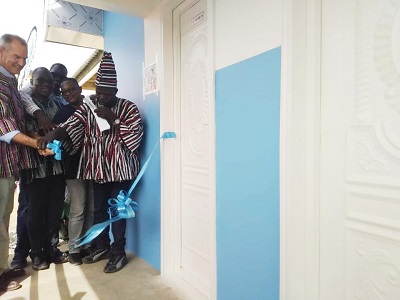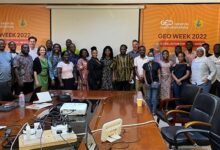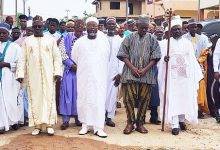
Water AID Ghana, an international non-profit organisation, has constructed biodigester latrines for two health centres at Sombo and Dobile, in the Wa municipality of the Upper West Region to augment health care delivery of especially pregnant women and lactating mothers who would visit those facilities.
With funding from the Direct Aid Programme of the Australian High Commission in Ghana, the four and eight seater biodigester latrines constructed at the cost of $ 80, 000, are expected to promote good sanitation practices at the two facilities as well as their respective maternity wards.
Prior to the construction, the Sombo Community Based Health Planning and Services (CHPS0), had a two-seater ‘KVIP’ which was woefully inadequate for the population it served and the Dobile Health Centre did not have a toilet for its clients, whereas the maternity wards of both facilities had no bathrooms and functional toilets.
Country Director for WaterAid Ghana, Mr Abdul Nashim, stated this in an address during the commissioning and handing-over of the facilities at Sombo on Saturday.
He said: “Water and sanitation hygiene is very possible, universal health coverage irrespective of your economic status is also possible hence the need to assist the major underprivileged groups with facilities as these to promote their well being.”
Mr Nashim appealed to the government to ensure that all new health centres were provided with the necessary facilities such as latrines, hand washing facilities among others.
The Australian High Commissioner to Ghana, Andrew Barnes hinted that the facilities that were handed over were part of 10 projects undertaken with Direct Fund Programme in 2018 and and announced that 21 other projects had been earmarked for this year.
“In Ghana, the Ministry of Health estimates that inadequate access to water and sanitation hygiene, WASH services contributes to about 15 per cent of maternal deaths. That is a huge number but a number that we can change,” he stated.
Mr Barnes expressed optimism that with the construction of the facilities, open defecation would become a thing of the past and it also affords women and children the opportunity to stay away from diseases like cholera and diarrhoea, which came about as a result of filth.
He urged them to assume full ownership of the facilities and ensured that they undertook repair and maintenance works to ensure a longer lifespan.
In a speech read on his behalf, the Upper West Regional Minister,
LYDIA DARLINGTON FORDJOUR, WA







